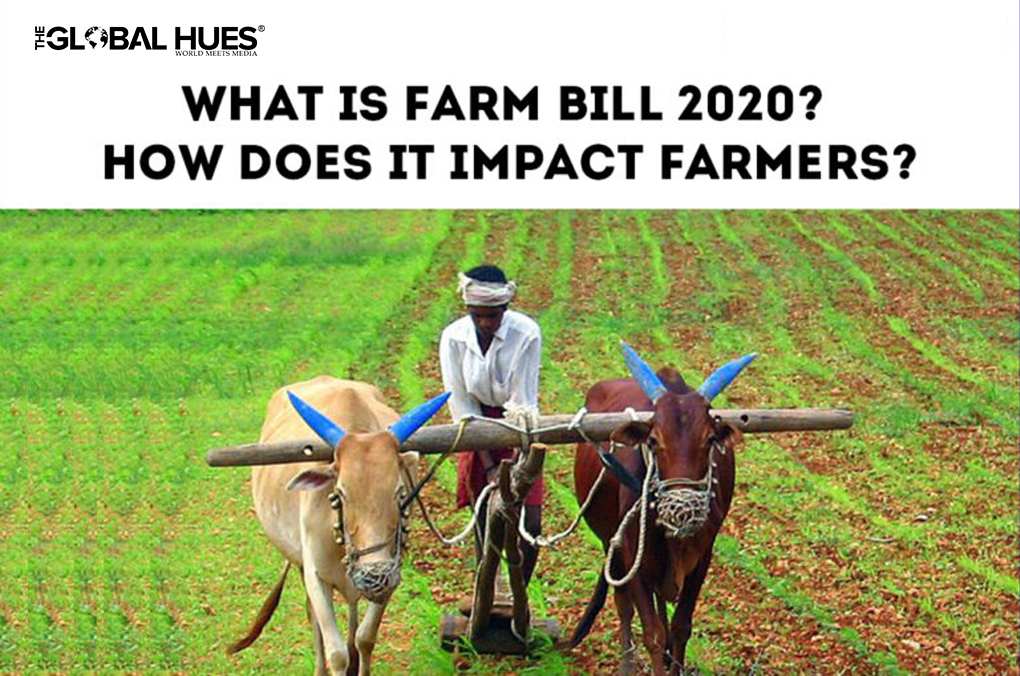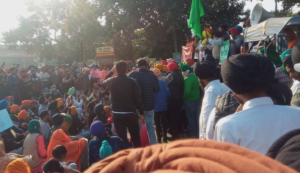India is an agriculture-based country. Since times immemorial, India has been nurturing and feeding its population with ample supply exported to foreign countries. Agriculture has been a major portion of the Indian economy taking up 17-18% of GDP. 50% of the country’s employment results from the agriculture sector. Farm Bill is also an important factor to take it into consideration.
Despite the undeniable importance of agriculture in India, why are farmers protesting against Farm Bills 2020?
PC: Twitter
To understand the answer to this question, let us first give you a brief of Farmers history in India.
When “Jai Jawan Jai Kisaan” took birth
In the year 1965, soon after the death of independent India’s first prime minister Jawahar Lal Nehru, India was attacked by Pakistan. Lal Bahadur Shastri was the Prime Minister of India at that time. He announced retaliation against the war.
The war exhausted the scarce resources of India. Thus, resulting in food scarcity at a dangerous level. Lal Bahadur Shastri’s slogan “Jai jawan Jai kisaan” (hail soldiers hail farmers) encouraged the soldiers as well as cheered farmers to catapult the need of the hour, Farm Production. The threat of hunger overcame with the support of the farmers of India.
What are the living conditions of farmers in India?
India is called the land of farmers, as most of the people of the country are directly or indirectly involved in the agriculture sector. However, it is disheartening to report that the condition of most farmers is terrible. About 80% of farmers in India are marginal (less than 1 hectare) or small farmers (1–2 hectare) category.
It is ironic to report a scenario where every day, there are reports of Indian farmer suicides from different parts of the country while people sitting in air conditioner rooms are formulating policies to rectify the problems of farmers.
Many reasons push farmers on the edge. One major problem is that there is no proper irrigation facility. Only 40% of arable land has got irrigation facility through canal and tube well & rest 60% depends heavily on rain. If monsoon fails for consecutive 2 years, there is no way a poor farmer can pay his debt. The pressure and humiliation reach their peak. Looking at this deplorable condition and no hope, some farmers take extreme steps such as Suicide that impact generations.
Farmers get only 20%-50% of what consumers pay. In simpler terms, if you as a consumer pay Rs 40 for cauliflower, the farmers get Rs 8 to Rs12 for it, while the major part of that income goes into the pockets of middlemen. This way the system of middlemen drastically reduces the earnings of farmers.

Pc: Gupshup
How do farmers of India sell their crops?
After growing a crop a farmer has 3 options to sell the crop in India.
1.The Local Market
The farmers with small quantities of crop find the local market as the best option to sell any crop. This is because the farmers can sell their crop to a local shop or moneylender or in a local market at an individual price. It saves the costs of transportation, storage, and warehouses. This method is the most opted method by small farmers.
2.APMC (Agricultural Produce Market Committee)
APMC is a marketing board which was established by the state government for the convenience of farmers. Various facilities are provided by the state government including the cold storage and warehouses. They increase the shelf life of crops, provide a suitable environment for their storage, and help farmers with large produce to safeguard their crops. Farmers just have to spend on transportation.
Problems in APMC
Sadly, APMC is not 100% transparent. There have been many issues since its establishment, pointing to the need for another way to help farmers. Many middle men fall in the APMC chain taking away a major portion of profits that should ethically belong to farmers selling their produce. The farmer doesn’t receive a fair price in this process.
To understand it in a better way, let’s say a farmer sells his crop at a price of Rs 200 to a middleman at a commission of 5-6%. Ethically speaking, the middleman should get only 12 Rs and the farmer should get Rs 188. However, the scenario is not the same. The middleman uses this opportunity to sell the crops to consumers at a much higher rate, skimming the majority of profits.
3. MSP
The problems in APMC led the government to introduce a minimum support price (MSP) to help farmers get a fair price. The MSP is fixed on essential crops. The farmers were given an alternative to sell their crops directly to the government at MSP.
The intention behind MSP was to uplift farmers’ economic crunch. However, it failed to do so. The local markets and consumers started valuing the crops at MSP only. In a split of seconds the Minimum Support Price announced for farmers’ benefit converted into the fixed price for their crops. It became a maximum support price pushing Farmers again in a pit. This time deeper. However, MSP provides the farmers a security and assurance of receiving a decent price in case of adversities.
Another reason behind the failure of MSP is that the cost of cultivation varies across the states of India whereas the MSP remains the same throughout.
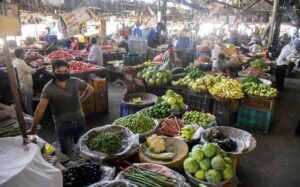
Pc: The Hindu
The government and the MSP
MSP has turned into a headache for the government and since years they are trying to get rid of it. But the question arises, Why? When the government itself announced MSP to help farmers, why would they want to revoke it now?
According to our report, the government has to sell the crops brought by farmers at a cheaper rate to ration cardholders. This puts the government in a situation of loss. It has been many years since the government is looking for alternatives regarding the matter of MSP.
Current farm bill 2020
- The farmer’s produce trade and commerce(promotion and facilitation)bill,2020.
- This bill allows farmers to sell their crops outside the APMC mandi.
- Large scale farmers sell in APMC mandi to secure their crops under MSP.
- There are 7000 APMC mandi divided areawise.
- For the farmers nearer to the APMC of another area, this bill is beneficial.
- Tax will not be applied on any sale and purchase of the crops outside the farmer’s state APMC.
- They can sell crops to any private company.
- The farmers (empowerment and protection) agreement of price assurance and farm services bill,2020
Production in farming is unpredictable. Farmers can gain or lose on the prices of the production. Therefore, this bill involves contract farming. Farmers and private companies will have a legal contract agreement. In this agreement, the price and the incentives like storage, warehouse, quality, and quantity of farming will be already mentioned.
What troubles farmers about this bill are the consequences in case the crop is not grown as per private companies’ legal contract requirements. Crops may vary season to season, or every time they are grown even on the same land. This makes the uncertainty of achieving exact results as demanded by private firms very high. The farmers have never been in legal bounds with private firms before. This whole concept is foreign and fearsome for them. There are loopholes. Farmers are not in a situation to agree with any bill that might put their living at risk.
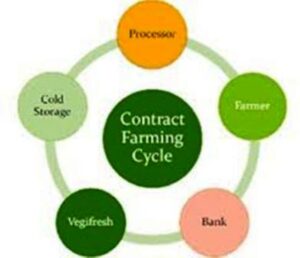
PC: Krishi Jagran
-
The essential commodities (amendment bill),2020
Some changes have been done in the already introduced bill of 1955. According to this bill, one cannot store the essential commodities. But there is no proper definition of essential commodities. These commodities are added and removed accordingly over the period from a list decided by the government.
For example, masks and hand sanitizers were added to this list in march 2020 but were removed in July 2020. These commodities are completely controlled by the government
When production of a product decreases the price increases and vice versa. This bill tackles the problem of Hoarding, which increases product cost. The lack of availability of a product in the market leads to high demand and selling of product begins at a very high cost. The government can have the liberty to add that crop to the essential list to avoid Hoarding.
This bill has removed crops like cereals, potatoes, onions, oil, and rice from the essential list. They will be added again only in time of emergency.
Small-scale farmers don’t have the infrastructure to store these crops. Only large scale farmers could yield out the benefits from this third bill.
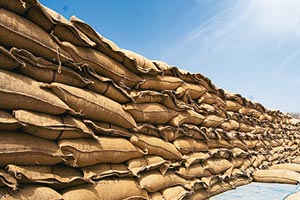
PC: the mint
How does this bill impact farmers? Why are farmers opposing these bills?
According to Farmers the government’s intention in the first bill is to eradicate the APMC market. If the government involves the private runners, the corporate will offer fair prices initially and APMC will gradually diminish. Labor will become cheaper in urban spaces. This will abolish the MSP load on the government too.
There is a loophole in the second bill. Any legal agreement with the private company can include a dispute.
Who protects the farmers then?
This farm bill only states that any dispute will be resolved by the sub-divisional magistrate. No civil court shall have jurisdiction. This makes dispute redress weak and can be exploited by the corporates.
Farmers want the government to add MSP in this bill to secure their production.
The fears as stated by farmers include:
- No involvement of the judiciary in any dispute.
- Trust issues with the corporate as they can cancel on the produce.
- Demolishing the commission agents will threaten the security like loans which they can’t take from banks because of high-interest rates.
- Large scale farmers won’t be affected by the bill as they are already traders and are in touch with the corporates.
- They will become dependent on private mandis.
Why are Haryana and Punjab farmers mostly involved?
The economy of both of these states is agriculture-based. Every year the government purchases rice and wheat from these states in the bulk. Haryana contributes 60% of the total basmati rice exported from India. Punjab contributes about two-thirds of wheat production. The tax is paid by the government to the state in this purchase. In 2019, Punjab earned around 3500 crores in the form of tax. This tax is used for various purposes by the government such as in providing electricity to farmers. Now, due to the new bills, the state will not receive the tax impacting the farmer’s wellbeing.
These acts don’t address the problems like the decline in soil health, farmers’ household debt cycle, high input cost, and lower profit margins. These farm bills focus on marketing and not on the production of crops.
Government’s stand on the matter of farm bills
“The farmers should get the advantage of a big and comprehensive market which opens our country to global markets,” Prime Minister of India Narendra Modi said as farmers protested in the capital. Modi hopes it will attract private investment into the agricultural industry, which has lagged as other parts of the country’s economy have modernized.
The call-out for protest against farm laws started on 25 September 2020. The farmers later decided to pressure the central government when their respective state governments couldn’t support them.
On 25 November 2020, begin the historical protest when protestors from the Dilli Chalo (“let us go to Delhi”) campaign were met by police at the borders of the city.
The police used tear gas and water cannons, dug up roads, and used layers of barricades and sand barriers to stop the protestors. This led to at least three farmer casualties.
Amidst the farmer agitation, on 27 November, the media highlighted the actions of youth who jumped onto a police water cannon targeting protesting farmers and turned it off. He was later charged with attempted murder.
On protesters’ demands, the Central Government Of India allotted the date of 3 December 2020 for discussing the future of the new farm laws.

PC: Twitter
“The Indian government under the leadership of Prime Minister Modi has always stood in full commitment to resolving the problems faced by farmers and will continue to stand by them,” said Narendra Singh Tomar
Tomar urged farmers to abandon their protests and instead discuss their issues with the government although so far, Modi has shown no sign of capitulating to protesters’ demands.
The whole nation is standing in support of farmers from social media to reaching the spots of protest. Due to covid-19, the concerns are greater. However, the farmers are dedicated to their struggle and they are ready to stand their ground as long as it takes.
“The government has no ego issues. The talks were with an open heart. Farmers’ leaders raised several issues and gave us their views on them. We have assured them that each of the points raised by them will be reviewed by the government and we will meet again on December 5,” Narendra Tomar agriculture minister said after the round of talks with farmer unions.
Even after many meetings going on with the government of India, the big farm union leaders and Farmers are not happy with the outcome. The protests are peacefully taking place at different spots in India. However, the way the Government handled the protests using water cannons and tear gas is criticized by many.
“We will go back review each of these provisions. We will see how we can bring parity between existing Agricultural Produce Market Committees (regulated markets) and free markets. It may bring new measures to strengthen APMC markets,” Tomar said.
The Government is making efforts to solve the matter as quickly as possible. But the efforts are not enough to satisfy the farmers.
The farmers concluded to the government’s approaches when one of their leaders stated that the issue is not about “anyone particular clause”, but about the “direction in which the government is pushing farming in India”, said Avik Saha, secretary of the All India Kisan Sangharsh Coordination Committee (AIKCC).
Why are other countries getting involved in the farmer’s issue?
Canadian Prime Minister Justin Trudeau came out as the first international head of government to speak up on the protests by farmers in India against the new farm laws.

PC:scroll.in
Politicians in the United Kingdom such as Labour Party leaders Tanmanjeet Singh Dhesi, Preet Kaur Gill, and John McDonnell have also spoken out.
“I stand in solidarity with the Punjabi farmers in India protesting for their livelihoods and protection from misguided, manipulative government regulations,” Congressman Doug LaMalfa
“Punjabi farmers must be allowed to protest peacefully against their government without fear of violence,” said the Republican lawmaker who represents Californian’s first Congressional district.
India has called the opinion by foreign politicians on protests by farmers as “ill-informed” and “unwarranted” as the matter about the internal affairs of a democratic country.
The longstanding links of native land farming in India impact Sikhs and Punjabis living in foreign lands majorly Canada and the UK. Many British Sikhs and Punjabis have taken this matter up with their MPs, as they are directly affected by their family members’ situation and ancestral land in Punjab.
Canada has always been known as a voice for world human rights. This can be emphasized upon through its central role in drafting of the Universal Declaration of Human Rights in 1947-48 and continues today with it being a party to seven major international human rights conventions Canada has spoken for the Rohingya, and on Chinese human rights abuses in Hong Kong and on the Uighurs. Earlier this year, Trudeau was the only world leader who expressed disapproval, in defiance to Donald Trump, while supporting the Black Lives Matter movement.
In a globalized world, taking a stand for what’s right like Trudeau should be imbibed by more and more world leaders. He is speaking for his constituents but also for the powerless, around the globe.
What could be the possible solutions to this issue?
- Farmers should be made aware of the existing laws for farmer protection.
- Under the consumer protection act of,1986 in the contract farming dispute a farmer can approach consumer court. The Supreme Court will give its ruling when a farmer will buy services from a company for the production. Here, the farmers will act as a consumer.
- In case of any breaching of the contract, the consumer court would help the farmer.
- A written agreement with private players will provide proof of terms.
- The communication gap between the farmer union and the government should be eradicated by several discussions and not using the digs and water cannons and tear gases on the protesting farmers.
Is there a positive side to new laws? How could farmers see the positive side?
- The misinformation that contract farming will lead corporations to buy farmers’ land should be annulled.
- Contract farming has a section stating that no farming agreement can be entered into the purpose of land purchase, mortgage, and lease.
- They will be able to engage in direct marketing for full price realization.
- The third bill could help in cutting wastage of farm produce.
New updates on the situation:
- Government to claim that there is no eradication of MSP and it will remain applicable just like before. But farmers demand legal status on the MSP.
- Protesting farmers are planning a tractor march in Delhi on January 26 alongwith the marches towards governors houses in different states.
- The farmers claimed to have only 5% issues resolved in the meeting with the officials. The next round will be held on 4 January.
- Union minister of state for agriculture, Kailash Chaudhary says that the ongoing farmer’s protest will come to an end with a solution on January 4.
Conclusion
Farmers have always been promised better incomes by the government at the time of elections. Sadly, since independence farmers have least tasted betterment. The farm bills can enhance the modern market and investment for modern agriculture. A farmer also has full right to feel secure and trust the laws. The demands and protests should be listened to by the government of a democratic country like India.
Also Read:
- From Financial Crisis To Global Cooperation: The Evolution Of G20
- Foss India: Delivering Best-in-Class Analytical Solutions To The Food And Agriculture Industry
- SpaceMax: Offering Smart Furniture Solutions To New-Age Buyers
- Srishti Arora: The Agro Game Changer
- Global Uncertainty And Economic Slowdown: How Well Is India Performing?
- Suryan Organic: A One-Stop Shop For An Ethical, Premium Organic & Best Quality Products

